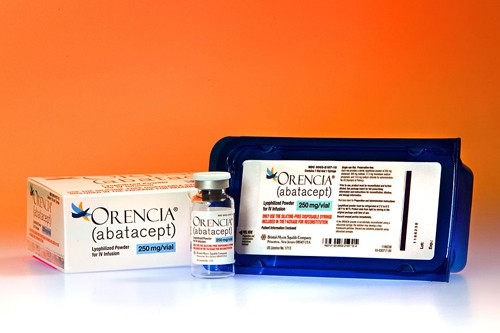
Two-year data from a head-to-head trial suggests Bristol-Myers Squibb’s (BMS) Orencia is as effective as AbbVie’s Humira in treating patients with moderate-to-severe rheumatoid arthritis (RA).
The updated results of the AMPLE study (interim data was reported last year) confirm that Orencia (abatacept) works as well as market leader Humira (adalimumab) when used alongside methotrexate to treat RA patients who have not previously received biologic therapies for the disease.
Both drugs achieved an ACR20 (American College of Rheumatology 20 per cent improvement) in around 60 per cent of patients after two year’s therapy, with the onset of response also similar between the groups, according to a presentation of the data at the European League Against Rheumatism (EULAR) conference yesterday.
Humira is one of the biggest-selling pharmaceutical products of all time, bringing in $9.3bn for Abbott last year before its pharma unit was hived off as AbbVie, and are still growing. Analysts suggest sales of the tumour necrosis factor (TNF) inhibitor could peak at around $11bn in 2016.
Orencia is trying to carve out its own slice of the market and – because it has a different mechanism of action to Humira and other TNF inhibitors dominating biologic therapy for RA – the AMPLE trial is seen as critical for the drug’s prospects.
BMS’ drug is the first in a new class that binds to the CD80 receptor and blocks T cell proliferation, and has already carved out a useful nice among the 20 to 40 per cent of RA patients who do not respond to TNF blockers.
Sales of Orencia came in at $1.17bn last year – up 28 per cent on 2011 – and its growth trajectory looks set to continue following the introduction of a more patient-friendly subcutaneous formulation in 2012, which has already allowed the drug to grab the number three spot among subcutaneous RA formulations in the US.
The AMPLE data should help the drug establish itself more firmly in the biologic-naïve RA population as well, although the entire RA sector is likely to shaken up in the coming years following the introduction of Pfizer’s Xeljanz (tofacitinib), the first of a new generation of oral RA therapies heading to market.
Xeljanz has been predicted to reach $2bn in sales on its own, although its prospects have been thrown into doubt after the EU’s Committee for Medicinal Products for Human Use (CHMP) rejected Pfizer’s marketing application for the drug last month.




